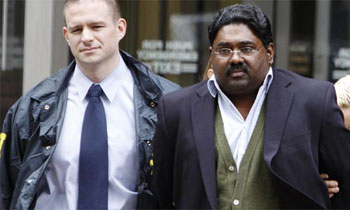 Lawyers for Raj Rajaratnam, the Galleon hedge fund founder who in October 2009 was charged by the government for illegal insider trading, said an FBI agent made false statements in obtaining court approval for investigators to secretly record the billionaire’s cellular phone calls.
Lawyers for Raj Rajaratnam, the Galleon hedge fund founder who in October 2009 was charged by the government for illegal insider trading, said an FBI agent made false statements in obtaining court approval for investigators to secretly record the billionaire’s cellular phone calls.
Rajaratnam’s lawyers argued that 2,400 wiretaps recordings made over a nine month period in 2008 were obtained by the government in violation of the Fourth Amendment. In a motion filed Friday in New York, Rajaratnam’s defense team asked a federal judge to not allow prosecutors in his criminal insider-trading case to use wiretaps recordings, saying it was improperly obtained.
Recorded calls between Rajaratnam and Roomy Khan, a former trader and the government’s star witness in the case, contained no evidence of illegal insider trading in stocks, the motion filed in U.S. District Court in New York said.
Complete Rajaratnam motion documents »
– “The government deliberately and/or recklessly misled the Court about the credibility of Roomy Khan, the government star’s witness. Agent Kang’s affidavit falsely asserted that government witness Roomy Khan — whose statements were the focal point of the government’s probable cause allegations and the resulting wiretap authorization — had not yet been charged with a crime and was a “reliable” witness. In fact, Ms. Khan was convicted of wire fraud in 2002, made false allegations against Mr. Rajaratnam which the government acknowledged it could not substantiate despite an “exhaustive” investigation, destroyed evidence, colluded with another witness to obstruct the government’s investigation and committed additional crimes between 2004 and 2007-none of which was disclosed to the authorizing Court.
– Ms. Khan is an unreliable witness by the government’s own determination. The Motion indicates that in a wiretap extension application, the government quietly dropped the label “reliable” from their description of Ms. Khan’s evidence, apparently hoping the Court would not notice. Nor did they inform the Court or in subsequent applications that Ms. Khan again lied and again obstructed justice by obtaining a cell phone under false pretences and using it to fabricate a story with a co-conspirator who, no doubt warned off by Ms. Kahn’s call, remains a fugitive from justice today. If the government itself no longer considered Khan to be reliable, it had a duty to tell the Court and to discontinue its reliance on her in its affidavits. As a result, the Motion maintains that all of the affidavit’s references to Ms. Khan’s evidence must be stricken.
– The government deliberately and/or recklessly mischaracterized publicly available information as inside information that benefitted Mr. Rajaratnam. Agent Kang’s affidavit was false and misleading in summarizing phone calls about Intel and Xilinx selectively and in a manner that implied improper conduct where none existed. In fact, there is no evidence whatsoever of insider trading on these calls, the information discussed was publicly available, his predictions were wrong and Mr. Rajaratnam had no trading positions in either company at the time — facts which Agent Kang concealed from the Court.
– The government failed to inform Court of a lengthy government investigation of Mr. Rajaratnam dating back to 2001 – material information that would have led the Court to deny the wiretap request. Further, Agent Kang misled the court by stating that the investigation of Mr. Rajaratnam started in late 2007, when in fact it began in 2001. Title III requires that wiretap applications contain a “full and complete” statement demonstrating the “necessity” of a wiretap that conventional investigative techniques had proven unsuccessful and/or futile. Agent Kang failed to reveal from the application the material fact of a nine-year SEC investigation with which Mr. Rajaratnam and his company, Galleon, cooperated fully. Indeed, the investigation provided the government with four million pages of Galleon records (including instant messages, emails, trade data, and business records), and dozens of hours of sworn testimony, including a lengthy deposition of Mr. Rajaratnam.”
John Dowd, a lawyer for Rajaratnam, also argued that insider trading isn’t an offense in which Congress has authorized prosecutors to use secret wiretaps to obtain evidence.
“Moreover, in its zeal to break new ground and in an effort to salvage its nine-year pursuit of Mr. Rajaratnam, the government violated its obligation of candor and forthrightness to the court and, as a result, intercepted Mr. Rajaratnam’s telephone calls in violation of the Constitution” and the law authorizing wiretaps, Dowd said.
The trial of Rajaratnam is scheduled to start on Oct. 25.
- Bulenox: Get 45% to 91% OFF ... Use Discount Code: UNO
- Risk Our Money Not Yours | Get 50% to 90% OFF ... Use Discount Code: MMBVBKSM
Disclaimer: This page contains affiliate links. If you choose to make a purchase after clicking a link, we may receive a commission at no additional cost to you. Thank you for your support!

It must be the first time the FBI has ever lied. In my case, and in order to cover up major crimes committed by “well connected” entities, the FBI told me the truth, stating that acts of terrorism, recurring threats to murder children and women, production and distribution of fake ID’s, and police demands for bribes “do not rise to a level that requires an investigation”.
I truly believe the FBI.